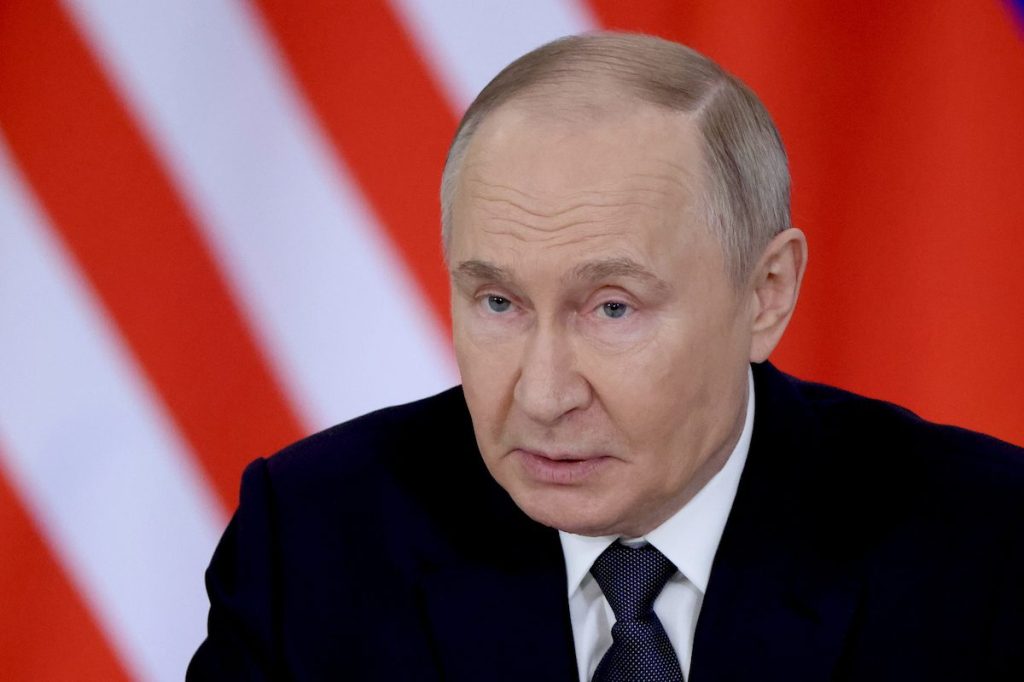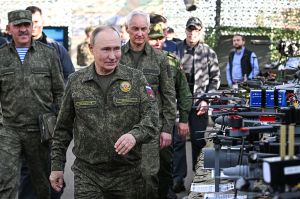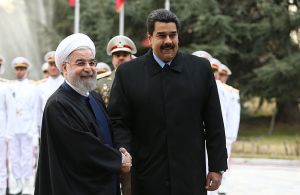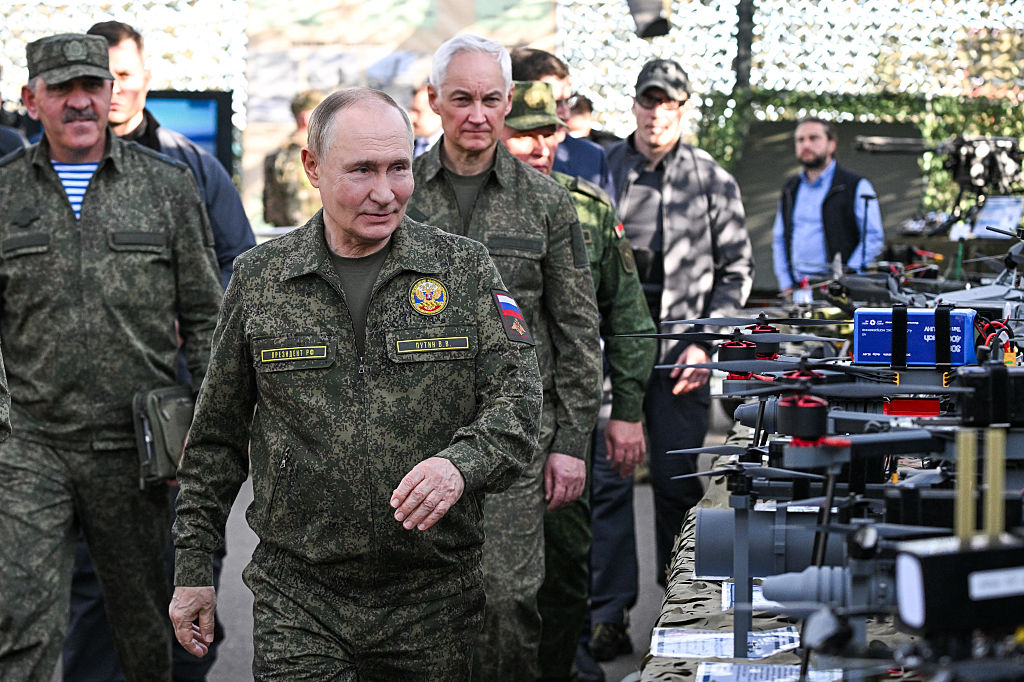Israel’s assault on Iran represents a double helping of good news for the Kremlin. Years of two-track diplomacy have allowed Vladimir Putin to position himself both as a friend to Israel’s Prime Minister Benjamin Netanyahu and to the Iranian leadership. That will make Russia an indispensable partner for the US once it embarks on the long process of patching up the new political realities of the Middle East in the wake of this war. Though Israeli planes have so far carefully avoided striking Iran’s oil export infrastructure, the war has inevitably spooked markets and boosted sagging crude oil prices – and with them, Putin’s war chest.
Over three months of inconclusive negotiations with the Trump administration over ending the Ukraine war, Russian negotiators always insisted that Ukraine was just one part of a global package of military, economic and political issues where Washington’s fundamental interests could align with Moscow’s. Now it’s happened. In the wake of the Israeli strikes, Putin was the only world leader to speak by phone to Netanyahu, Iranian President Masoud Pezeshkian and Donald Trump.
Thanks to Israel’s devastating military strikes, Washington now faces a multi-dimensional challenge as it simultaneously tries to prevent a global oil price shock, a bilateral war between Iran and Saudi Arabia and blowback against US military and civilian targets by Iranian agents or proxies. Russia, with its military and diplomatic ties to Tehran, will inevitably be part of that diplomatic balancing act. All of a sudden, pressuring the Kremlin into winding down operations in Ukraine seems like small potatoes compared to helping prevent the whole Middle East from going up in flames.
Russia has, of late, been cosplaying as an ally of Iran. In the immediate aftermath of the Israeli strikes, Russia’s Foreign Ministry issued a strongly worded statement condemning the attacks as “categorically unacceptable” and warning that “all the consequences of this provocation will fall on the Israeli leadership.” Moscow also urged both parties “to exercise restraint in order to prevent further escalation of tensions and keep the region from sliding into a full-scale war.”
But that alliance of convenience is, in the Kremlin’s eyes, very much secondary to Russia’s more important role as a global power player that can stand alongside the US and China as an arbiter of world affairs. Putin may have signed a “comprehensive strategic partnership” treaty with Iranian President Pezeshkian in January, but he has his eyes on a far larger diplomatic prize – to boost his own standing as a power broker in the Middle East.
In his conversation with Netanyahu, Putin “emphasized the importance of returning to the negotiation process and resolving all issues related to the Iranian nuclear program exclusively through political and diplomatic means.” He also offered his mediation “in order to prevent further escalation of tensions,” according to the Kremlin’s readout.
In his call to Trump on Saturday, Putin also signaled Russia’s readiness to carry out “mediation efforts to de-escalate the crisis” – and reminded Trump that Russia has actually been a long-time ally of the US over its years of negotiations with the Iranians over their nuclear program.
Moscow’s relations with the Islamic Republic have always been very much an on-again, off-again affair. Back in the 1990s, Moscow helped Iran build its first Shehab long-range ballistic missiles and constructed Iran’s first civilian nuclear reactor at Bushehr, which became operational in 2013. Russia and Iran pooled efforts to shore up Bashar al-Assad’s government in Syria, with Russia deploying warplanes in 2015. Moscow also supplied S-300 air defense missile systems and has been importing thousands of Shahed drones, which it has fired indiscriminately at Ukraine.
At the same time, Moscow was a signatory of the US-brokered Iran nuclear deal in 2015, which was scrapped by Trump two years later. This year, Moscow has offered to handle the enrichment of Iran’s nuclear fuel as part of a possible updated nuclear deal. That arrangement could allow Iran to maintain a civilian nuclear energy program while depriving it of any excuse to enrich uranium to weapons-grade. And despite their professed alliance, Russia has also dragged its feet over selling Iran advanced Su-35 fighter jets that might be a match for Israeli jets in the air. Israel, in return, has refused to provide Ukraine with weapons despite strong pleas from Kyiv.
In the immediate aftermath of Israel’s attack, oil prices jumped from under $60 to $75 a barrel as nervous traders feared disruption to Iran’s ability to export crude. But it soon emerged that Israeli warplanes had not hit key infrastructure at the biggest Iranian oil terminal at Kharg Island, and traffic in the Strait of Hormuz at the mouth of the Persian Gulf appeared normal. Instead, Israel attacked Iran’s domestic energy industry, including gas processing plants and gasoline depots across the country – perhaps in an effort to spark price hikes that have spurred anti-regime protests in the past.
US Energy Secretary Chris Wright tweeted that the US was “working closely with the National Security Council to monitor the ongoing situation in the Middle East and any potential impacts to global energy supply.” Decoded, that means Washington will be urging Israel to hold off attacking Kharg to avoid catastrophic damage to the economy of Iran’s main customer, China. At the same time, Israel is keeping the option of escalating against oil infrastructure in its back pocket as it negotiates with both enemies and allies.
With every new conflict the importance of the Ukraine war to the West fades a little
All of this is good news for the Kremlin, which was facing the prospect of falling oil prices pushing up deficits and stretching budgets. A major conflagration in the Middle East promises to occupy the bandwidth of the world’s media – and with it the attention of electorates and politicians. “The world’s attention towards Ukraine will weaken,” tweeted Kremlin-aligned analyst Sergei Markov. “A war between Israel and Iran will help the Russian army’s success in Ukraine.”
On the minus side of the ledger, Israeli warplanes have reportedly blown up Iran’s Shahed drone factory in Isfahan just days after Ukrainian long-range drones damaged Russia’s plant for producing their own Shahed clones, known as Geran, in Yelabuga. That will put a dent in Moscow’s ability to continue its nightly swarm attacks on Ukrainian cities, which have seen as many as 450 Shaheds deployed in a single wave. But overall, that is a small price to pay for a conflict that suits the Kremlin down to the ground.
Last month, the Trump administration made Putin what seemed like an excellent offer – to cash out his gains and call a halt to his assault on Ukraine with a de facto border along the current line of control and a promise that Kyiv would never join NATO. But Putin refused. Many observers were mystified as to why. Now the picture becomes a little clearer. With every new conflict – especially a major Middle Eastern conflagration – the importance of the Ukraine war to the West fades a little. And the more opportunity Putin has to leverage Russia’s diplomatic weight and help Washington and Beijing solve the world’s problems, the further he moves away from being a warmonger and towards his coveted role as senior international statesman.
There is no way that Putin could have predicted Israel’s full-scale attack on Iran months ago when he began stalling on Trump’s peace deal. But he has always had the devil’s own luck.

























